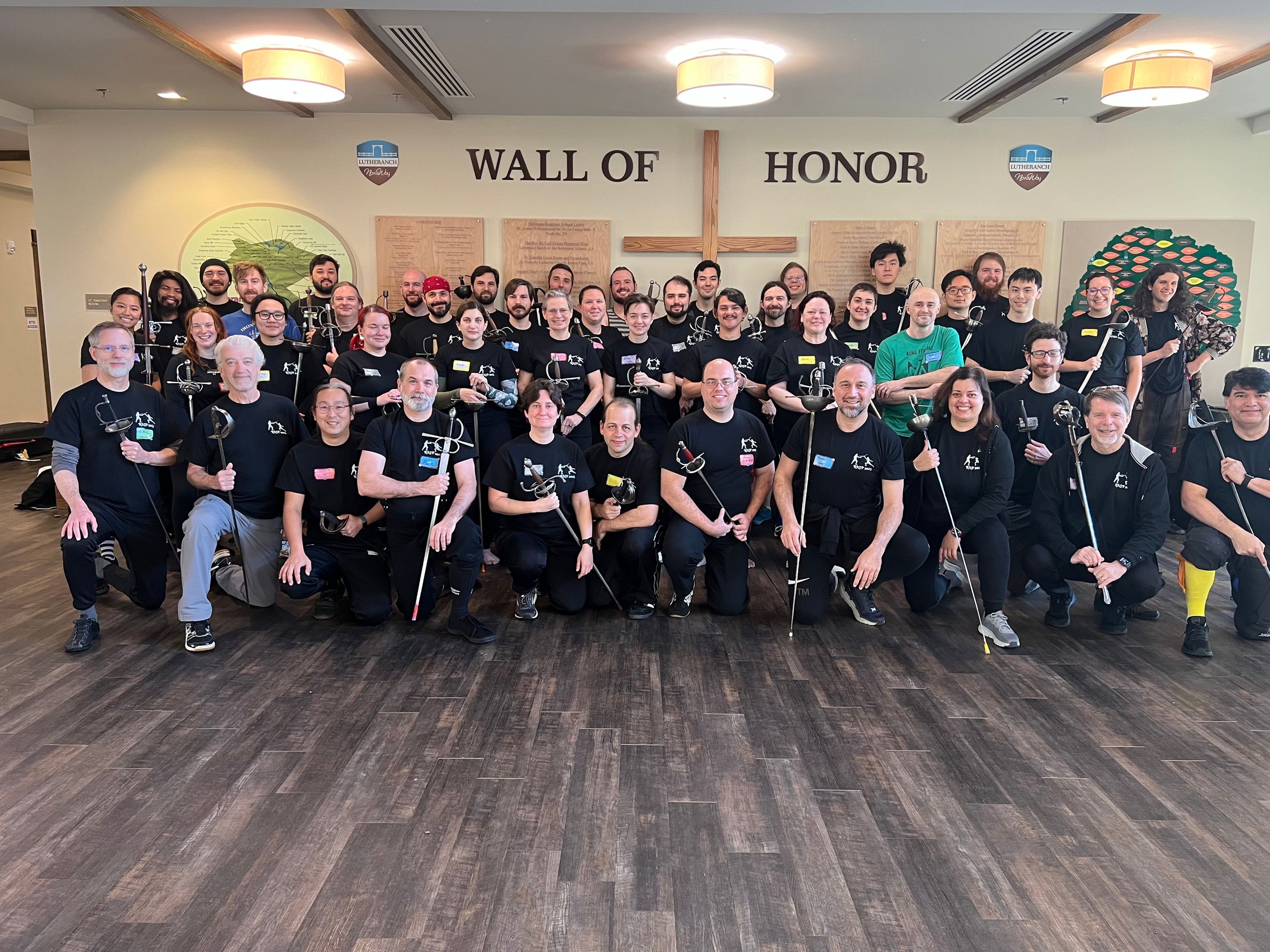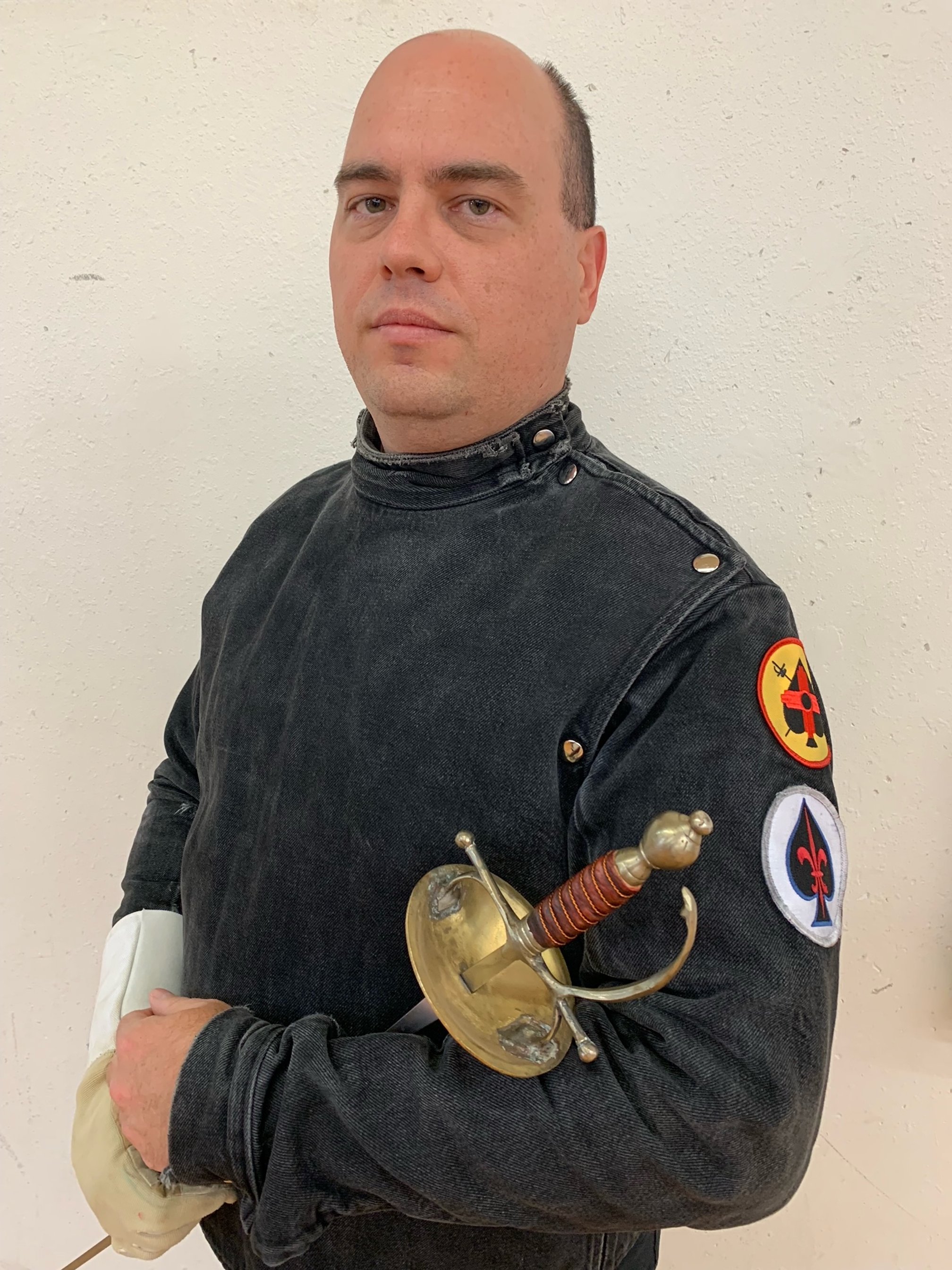Rapier and Saber Pedagogy Retreat (RASP) VIII
Tallapoosa, ga. february 14-17, 2025
The Retreat
The Rapier and Saber Pedagogy retreat is an intensive fencing instructor’s seminar focusing on the use of historical weapons, particularly the rapier and saber. Our curriculum is based on traditional Italian pedagogy, and our format closely follows that of Sonoma State University’s Fencing Certificate Program. Our four-day, four-night retreat will feature morning and afternoon sessions of group lessons, interspersed with lecture and discussion on the underlying theory, methodology, and pedagogy of Italian fencing. Registration is limited to 34 participants.
This year’s event will be held February 14-17 at Lutheranch, a retreat center about an hour west of Atlanta, GA. Registration includes food, lodging, and programming. Check-in opens at 4 pm on Thursday the 13th. Programming begins early morning on Friday the 14th.
Register here to reserve your space
Lodging and Registration Fees:
Dorm: $630
Shared Room: two full-sized beds in one hotel-style room. $725 ($525 for second member of same household - e.g. spouse or significant other, child)
Private Room: $840
These fees include all meals (Friday breakfast through Monday lunch), four nights of lodging, and all sessions and programming.
RASP Instructors
We are happy to welcome back the following RASP instructors
Maestro David Coblentz
David Coblentz received his master's coaching certification in Italian classical fencing in 2011. Since then, he has been exploring the application of classical fencing theory to rapier pedagogy. He is the co-author of Fundamentals of Italian Rapier and the author of numerous articles on fencing such as his 2017 HROARR piece, on Johann Georg Pascha's rapier lessons. He is the head instructor at the Decatur School of Arms, which he founded in 2012 with Dori Coblentz and David Lopez. In addition to teaching locally, he has led seminars at the Vancouver International Swordplay Symposium, SoCal Swordfight, Riposte Harlem, and Red Sun Classical fencing and others. He regularly teaches at the Sonoma State Fencing Master Certificate Program and, along with Dori, started the Rapier and Sabre Pedagogy Retreat in Atlanta, GA. David is also a member of the Order of Defense in the SCA and is currently active in the Kingdom of Meridies
Maestra Dori Coblentz
Maestra Dori Coblentz, PhD, received her master-at-arms certification through the Sonoma State Fencing Masters Certificate Program. Her 2021 book Fencing, Form, and Cognition on the Early Modern Stage: Artful Devices, is on the contributions of fencing theory and practice to Shakespeare and Jonson’s drama. Dori’s most recent fencing pedagogy work has been within the historical fencing movement, where she is particularly interested in curriculum development. She has published on this topic in a 2018 training manual, Fundamentals of Italian rapier: A Modern Manual for Teachers and Students of Historical Fencing, which she co-authored with David Coblentz. Along with David, she also runs the rapier program at the Atlanta historical fencing academy She teaches weekend seminars, and has taught classes at events such as Rapier in the Rockies, Riposte Harlem, the Southeast Renaissance Fencing Open (SERFO), and the Vancouver International Swordplay Symposium (VISS).
For more on her work in the fencing community, visit http://www.doricoblentz.com/fencing/
Maestro Puck Curtis
Puck began studying historical fencing in 1992 and researching Spanish swordplay in 1994. He is the co-founder of the Destreza Translation and Research Project and maintains the Theory and Practice section for the website. He has been a member of the SCA's Order of the White Scarf since 2001. Currently living in Folsom, California, he has been the primary historical fencing instructor for the Davis Fencing Academy and currently teaches Destreza as a martial art for the Sacramento Sword School with a special focus on the work of Pacheco and Ettenhard. He tested and received his certification as a Master at Arms before a traditional board of fencing masters with the San Jose Fencing Master's program in 2008 which is a branch of the Italian school of fencing. He has expanded the tradition by examining a number of instructors, provosts, and fencing masters and has served as a guest examiner for schools teaching historical sword arts. His current project is uniting the rigorous training and pedagogy of the classical Italian school with the theory and practice of the canonical Pachequista form of Destreza to preserve the tradition and share it with today’s western martial arts community.
Maestro Eric Myers
Eric Myers is a Master at Arms in classical Italian fencing, certified by the San Jose State University Fencing Masters Program in 2008. He teaches classical and historical fencing at the Sacramento Sword School, and at the Sonoma State University Fencing Masters Certificate Program. He is a cofounder of the Sacramento Sword School.
Maestro Myers began fencing in 1984, and researching Historical European Martial Arts in 1997. Since 2005 his historical research has focused on the martial arts of Spain and Portugal, and in 2010 he co-authored (with Steve Hick) a monograph and translation of the 17th century “Memorial of the Practice of the Montante” by Diogo Gomes de Figueyredo. Since then he has continued his research and translation activities, and has co-authored or collaborated several books on Iberian fencing. He has taught from these and other works at several large, international WMA events.
Maestro Kevin Murakoshi
After a childhood of swinging sticks around pretending they were swords, a chance meeting introduced Kevin to Historical Fencing. Kevin’s interests span 16th century fencing through the modern Olympic style. As a result Kevin is equally at home fencing with a rapier as he is with an electric epee. He is a certified Master at Arms in Classical Fencing from the Sonoma State Fencing Masters Program, and holds a Prevot d’Epee certificate from the USFCA
Kevin is co-founder of the Sacramento Sword School, a coach at the Davis Fencing Academy, and a visiting instructor at the Sacramento Historical Fencing Academy. Kevin is faculty at the Sonoma State Fencing Masters Program, and has taught seminars at WMAW, SoCal Swordfight, Riposte Harlem, KWAR and SERFO. Within the SCA, Kevin is a ninth generation White Scarf and a member of the Order of Defense. He was formerly Cadet to Don Puck Oneshoe, with whom he continues to work. Kevin will be available to work with participants in Italian rapier, foil, saber, and epee.
Kevin’s research interests include methods of applying modern and classical pedagogy to HEMA, and the evolution of fencing theory within the Italian tradition. As a fencer, Kevin’s primary systems are 17th century Italian rapier, Meyer’s longsword, and late 19th century Italian saber.
Maestro Ryan Mank
Maestro Ryan Mank began fencing in 2000 at Saint Louis University's Classical Fencing Society branch, and has been teaching fencing since 2006. In 2010 he began the certification process in classical Italian fencing pedagogy through the Sonoma State University Fencing Masters Certificate Program, attaining the rank of Instructor at Arms (2011), Provost at Arms (2013), and finally Master at Arms (2022). He served as an instructor at Classical Fencing Society St. Louis/Trovare di Spada in St. Louis, Missouri until July 2012. He then moved to Albuquerque, New Mexico, and founded Red Sun Classical Fencing in October 2012, where he continues to teach.
He has experience fencing and teaching both classical French and Italian styles, and has previously taught at such engagements as post-tournament seminars for the Classical Fencing Society, assisted teaching classes at CombatCon in Las Vegas NV, and at the SSU FMCP. He has worked with modern fencing coaches and masters to apply classical fencing principles to improve the technique of sport fencers. Over 15 years of competitive experience in classical fencing tournaments across the United States has guided his recent research, focused primarily on non-technical methods of evaluating one's opponents. He has also long been a proponent of the usage of the Smarra in Italian fencing training, and teaches it alongside Foil, Epee, Sabre, and Rapier.
Provost Tony Barajas
In 1991 Tony began fencing with French Foil and Hungarian Saber. He earned his Instructor’s certification of Provost at Arms in classical Italian Fencing (Foil, Saber, and Epee) at the San Jose State Fencing Master’s Program. Tony went on to study Fencing with Rapier and Dagger, Side Sword, Heavy Saber, and Longsword as well as foot combat in full armor. Classical Italian Fencing, along with his training in traditional martial arts including Aikido, Jujitsu, Kendo, Escrima, and Iaido gave Tony the scholarly foundation to interpret historical Italian Fencing treatises. Ultimately these studies inspired him to establish the Italian Renaissance Swordsmanship Academy (IRSA) where he serves as head coach. Students at IRSA study dagger, heavy saber, rapier, side sword, small sword, longsword, and grappling.
Provost Brad Cramer
Pirate, knight, and Jedi are just a few of the items on Brad Cramer’s fencing resume in addition to fencing instructor. Brad started fencing in 2004 when he cofounded the University of West Florida fencing club. He also became involved with fencing through the SCA where he achieved the Order of Defense (in 2016.)
Brad was introduced to the world of classical Italian fencing through Maestro and Maestra Coblentz, regularly attending RASP and SERFO events. In 2019, Brad earned his instructor-at-arms with historical concentration in rapier from the Sonoma State Fencing Masters Certificate Program and earned his provost-at-arms in 2023.
In addition to historical and classical fencing, Brad also competes and coaches in modern fencing and runs a pirate show at a beach resort complete with choreographed swordplay.
Additional instructors include:
Maestro Charles Dobbs
Provost William Byrne















